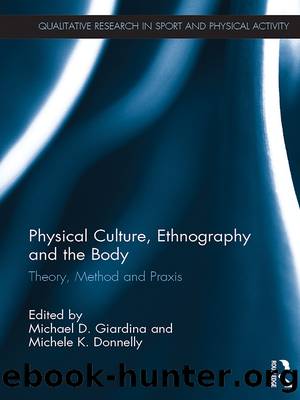Physical Culture, Ethnography and the Body by Michael D. Giardina Michele K. Donnelly

Author:Michael D. Giardina, Michele K. Donnelly [Michael D. Giardina, Michele K. Donnelly]
Language: eng
Format: epub
ISBN: 9781351970594
Barnesnoble:
Publisher: Taylor & Francis
Published: 2017-10-02T00:00:00+00:00
âThinking the social through the selfâ by writing beyond the academy
A final way that we have both engaged with reflexive feminist politics, is by publishing, speaking and participating in cultural spaces relevant to our research that take us outside of the realms of the academy. For Holly, this has included writing for subcultural media, consulting roles with action sports organizations, speaking on radio and television, and posting on social media. Rebecca has also contributed to these spaces, as well as participating in cultural festivals and exhibitions, and writing a blog. The latter work was particularly effective in highlighting the potential of subcultural contributions for engaging in feminist ethics and politics (Olive, 2013, 2015). For both of us, contributing outside of the academy has helped us think more deeply about the cultures we write about and participate in, helping us reflect on the language we use, the stories we tell, the assumptions we make and the issues we focus on. Writing about our own knowledge, experience and relationships (which we also do in our scholarship), is productive in helping us make sense of our subjectivity in context. Following Probynâs (1993) suggestions that we âthink the social through [ourselves]â (p. 3), we place ourselves at the center of the analysis, thus helping us account for how we are positioned as contextualized subjects in a web of spatial, relational and cultural politics (Probyn 2003). By publishing our work in the cultural fields we are discussing, we further emplace ourselves, our research and our analysis, allowing participants to engage with the ideas and take the opportunity to respond. In this way, we continue to strive towards research that is relevant and recognizable to the people it is about, and make sure we contribute to the improvement of conditions for women, both of which are cornerstones of feminist research (McLaren, 2002).
For Rebecca, writing into surfing culture has been productive in a range of ways. Her blog and media contributions have allowed her to check analyses, to generate data, and to disseminate findings, but they have also allowed her to reflect on the assumptions embodied in her surfing/researching subjectivity. In particular, interaction and dialogue via activated âcommentâ sections under posts, enabled readers to respond to ideas or examples, agreeing, disagreeing, providing new examples, and sometimes sharing the post with others. Holly experienced this following a post she made on a community Facebook page early in 2016, where she critiqued a local surf shop for putting a billboard sized poster of a sexualized female professional surfer to advertise a mainstream surf brand. The post received hundreds of comments about the appropriateness of the image, comments that both strongly supported Hollyâs argument and disagreed with her. Sparking intense debate in a small town that celebrates surfing athleticism and commitment while simultaneously priding itself on a level of social and environmental consciousness (e.g., rejecting transnational fast-food companies; protesting deep-sea oil drilling), the experience was simultaneously stressful and productive for Holly as both a long time community member and feminist scholar.
Download
This site does not store any files on its server. We only index and link to content provided by other sites. Please contact the content providers to delete copyright contents if any and email us, we'll remove relevant links or contents immediately.
Unstoppable by Maria Sharapova(3128)
The Inner Game of Tennis by W. Timothy Gallwey(3019)
Urban Outlaw by Magnus Walker(2961)
Crazy Is My Superpower by A.J. Mendez Brooks(2879)
The Social Psychology of Inequality by Unknown(2332)
The Fight by Norman Mailer(2168)
Unstoppable: My Life So Far by Maria Sharapova(2139)
Going Long by Editors of Runner's World(1929)
Accepted by Pat Patterson(1924)
Motorcycle Man by Kristen Ashley(1873)
The Happy Runner by David Roche(1837)
The Sports Gene: Inside the Science of Extraordinary Athletic Performance by David Epstein(1831)
Backpacker the Complete Guide to Backpacking by Backpacker Magazine(1828)
Futebol by Alex Bellos(1812)
Sea Survival Handbook by Keith Colwell(1802)
Mind Fuck by Manna Francis(1760)
Peak: Secrets from the New Science of Expertise by Anders Ericsson & Robert Pool(1675)
Endure by Alex Hutchinson(1621)
The Call of Everest by Conrad Anker(1558)
